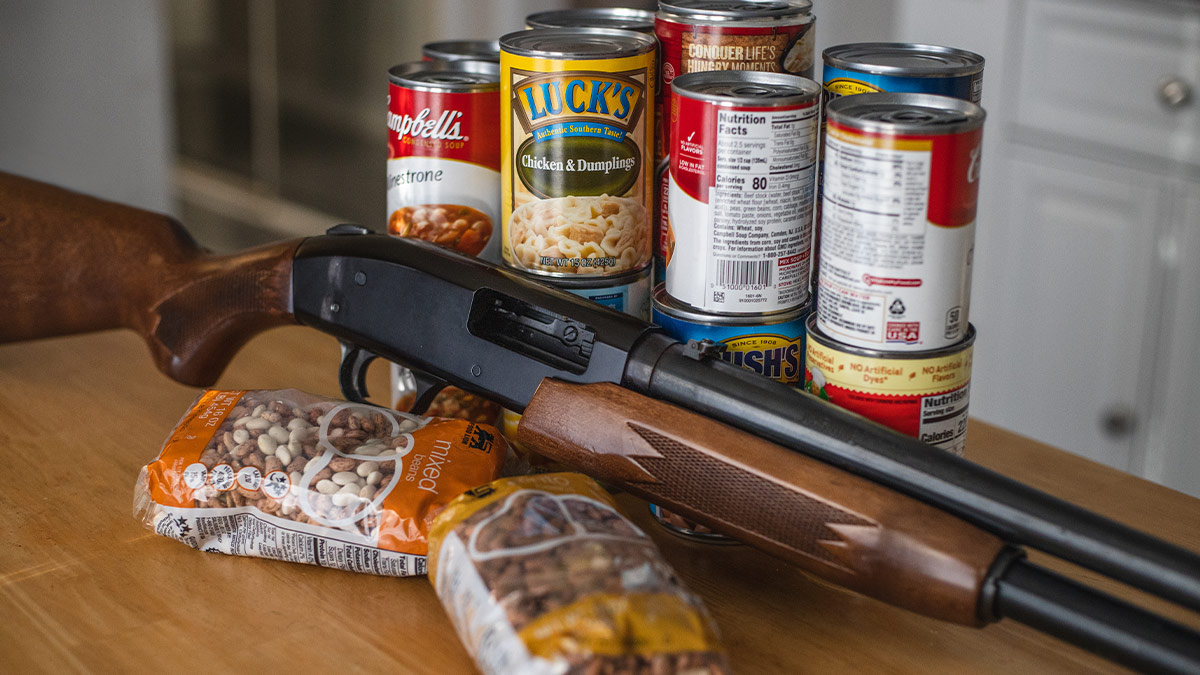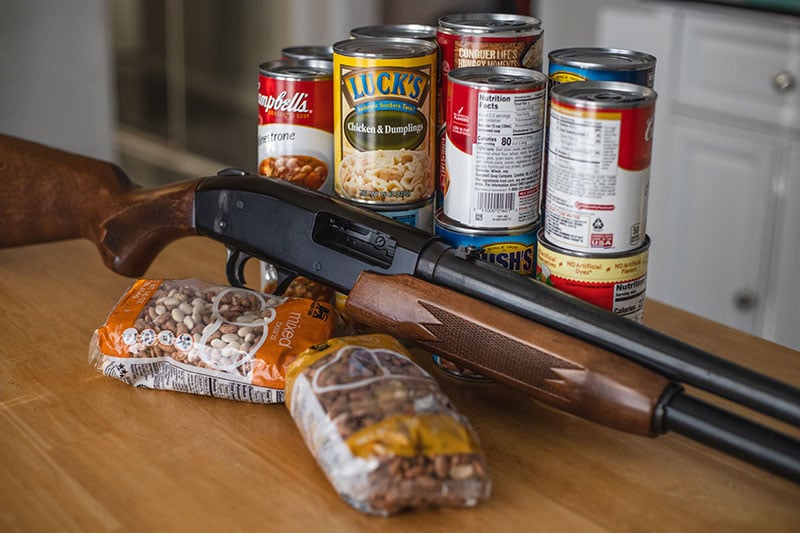
Stocking up on essentials before an issue arises doesn’t have to cost an arm and a leg. (Photo: Jacki Billings/Guns.com)
Erin Palette may be the face of Operation Blazing Swords but she also knows a thing or two about survival. A founding member of Blue Collar Prepping — a blog and Facebook group — Palette shares her knowledge and tips on preparing for the unexpected on a budget.
If survivalism is an art form, Palette uses her budgetary know-how to weave portraits of how regular people can stock up, prepare and ready ourselves for tough times. Guns.com chatted with Palette to get the scoop on the modern-day prepper and even grab some tips on how to start your survival stock.
Guns.com: I think for a lot of people, they hear prepping and imagine some crazy hoarder in a tinfoil hat with paper towels stacked to the ceiling in their basement; but the reality is that’s pretty far from the truth. So for those that may be confused by the term prepper, how would you define a modern prepper?
Palette: The pithy answer is “an Eagle Scout with more disposable income.” A more complete answer is that a prepper is someone who acknowledges that disaster, be it personal or large scale, can strike at any moment and is prepared to be their own first responder, to shelter in place, or to self-rescue as necessary — anyone who carries a concealed firearm or a tourniquet (preferably both) and who knows how to use it is some degree of prepper.
Guns.com: What got you interested in prepping and how did you get started?
Palette: I was the aforementioned Eagle Scout and I’ve always been a fan of Batman, so the idea of having the tools and know-how to respond to a crisis has always been appealing. Between the ages of 6 and 11, I lived in Cold War Europe under the constant threat of nuclear war and Soviet invasion, and my family practiced evacuation drills. I’ve also lived in Florida for most of my adult life and hurricane preparedness is just part of living here.
However, I began considering myself a true prepper around 2008 or 2009 when I was coping with the death of a loved one and needed to think about something else and do something with my restless energy. Since I live in a state that is frequently beset by natural disasters like tornadoes and wildfires in addition to hurricanes, I felt I needed to be prepared not just to shelter in place but also to evacuate without losing all my resources. Preppers call those situations “bugging in” and “bugging out,” and so I began to prepare for both.
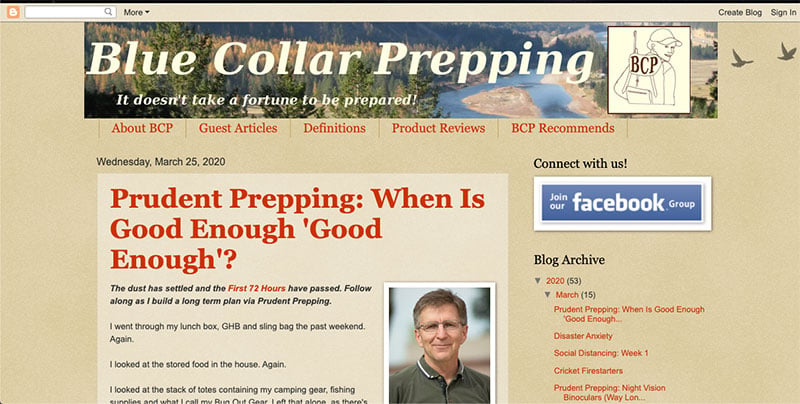
Blue Collar Prepping shares tips and tricks on how to stock up, bug in, or bug out on a budget. (Screenshot: Guns.com)
Guns.com: I think there’s a misconception that prepping takes a lot of money or that you need to be financially well-off to do it but the site Blue Collar Prepping is all about being prepared on a budget. What are some key things that budget-conscious consumers can do to be more prepared?
Palette: Can I mention how much I hate Doomsday Preppers? Not only did it make most preppers look like lunatics, but in its thirst for sensationalism it rapidly veered into the photogenic-yet-unrealistic preps of people with fully stocked bunkers in their basement. I felt that emergency preparedness is something anyone can do, but if they’re bombarded with lurid TV shows which carry the message “Unless you can sink tens of thousands of dollars into prepping, you’re not doing it properly” they will think to themselves “Well, I can’t afford all that, so I guess I’ll take my chances.” Nothing could be further from the truth!
As I mentioned above, if you have a gun and a tourniquet, you have preps. If you have camping gear, you have the ability to bug out. If you have a pantry, you can lay in supplies for sheltering in place. Here are some quick and easy prepping tips that take little to no extra cash:
- Every time you go grocery shopping, pick up an extra can of food or an extra bag of dry good (rice, beans, lentils, etc). Pretty soon you’ll find that you have a month’s worth of food supplies.
- Take clothes which still fit but you don’t wear anymore and place them in a duffel bag or old suitcase along with some spare toiletries like a toothbrush, dental floss, travel deodorant and the like. Now you have to evacuate your home you already have a packed bag.
- Learn useful skills, such as first aid or how to start a garden or basic auto maintenance. Knowledge weighs nothing and is always with you.
- Get to know your neighbors. In a disaster, first responders may be too busy to arrive in a timely manner — or at all. If you are on good terms with your neighbors, then you can pull together during an emergency to help each other.
Guns.com: Food and water are always important items to have on hand for survival but how do guns and ammo play a role in preparing?
Palette: They play an important part, to be sure. Being attacked by someone who seeks to harm you is the very definition of a crisis, and having a gun allows me to be my own first responder. In fact, prepping led me to becoming a gun owner! My first gun was a bolt-action .22 LR which I bought so that I could harvest small game if I needed to. From there I bought a larger rifle, a shotgun, and then a pistol for concealed carry.
Security is a vital part of preparedness. If you have something that other people lack (like food, water, or shelter) they may try to take it from you, and you need the ability to say “No, I will not allow you to take this from my family.”
Guns also allow you hunt for food in a true grid-down or SHTF social collapse scenario. A .22 for small game, a deer rifle for big game, and a shotgun for fowling are all useful.
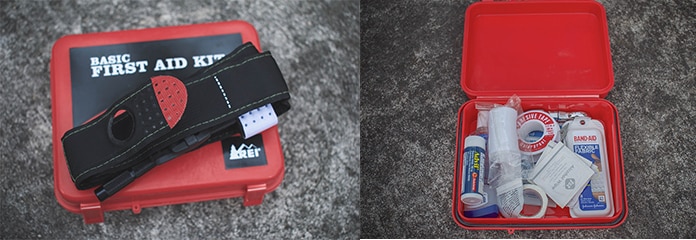
A well-stocked first-aid kit and the knowledge of how to use it proves vital. (Photo: Jacki Billings/Guns.com)
Guns.com: The Coronavirus has sent many people scrambling for supplies, guns, and ammo. For those that may be facing a wake-up call of sorts, what would your advice to them be as they start as beginner preppers?
Palette: Every new prepper focuses on the big disasters like economic collapse or nuclear war or the zombie apocalypse — or, in our current situation, an unstoppable super-virus. Trying to prepare for something like that is too much, too soon. Instead, start small and focus on personal disasters, such as “Let’s make sure we have an extra week’s worth of food in the pantry” or “What will I do if a family member is hospitalized?”
Start small and immediate, and then work your way out in both time and scope.
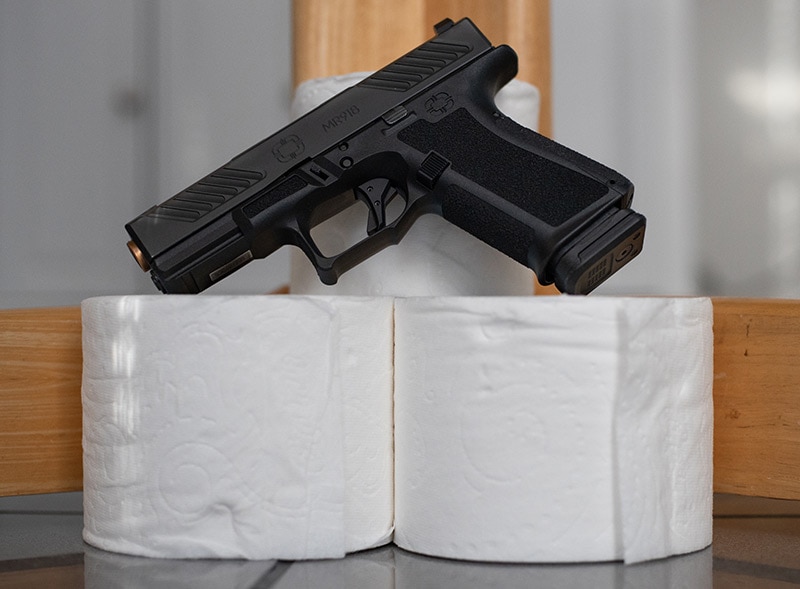
Ahhh the most coveted of all the supplies…at least according to those headed to the store during the Coronavirus pandemic….TP! (Photo: Jacki Billings/Guns.com)
For all those currently worried about having enough TP on hand — Palette wrote up the following suggestions on Blue Collar Prepping’s blog for surviving without Charmin.
-
“Gather up clean but unusable cotton fabric, like old t-shirts and torn bedsheets.
-
Give them all a good washing.
-
Cut them into toilet squares (4″x4″).
-
Use these as you would toilet paper to wipe after urination.
-
Placed used fabric squares into a lidded container until laundry day.
-
Launder the squares with soap and water to remove the urine from them.”
“For cleaning yourself after defecating:
-
Find a washcloth that you won’t use on your face.
-
Wet the washcloth under a running faucet.
-
Wipe until you are clean. This may require you to rinse the cloth under running water.
-
When you are fully wiped, get the washcloth soapy to kill any bacteria, then wring it out and let it hang dry.
-
Wash your hands as normal.”
